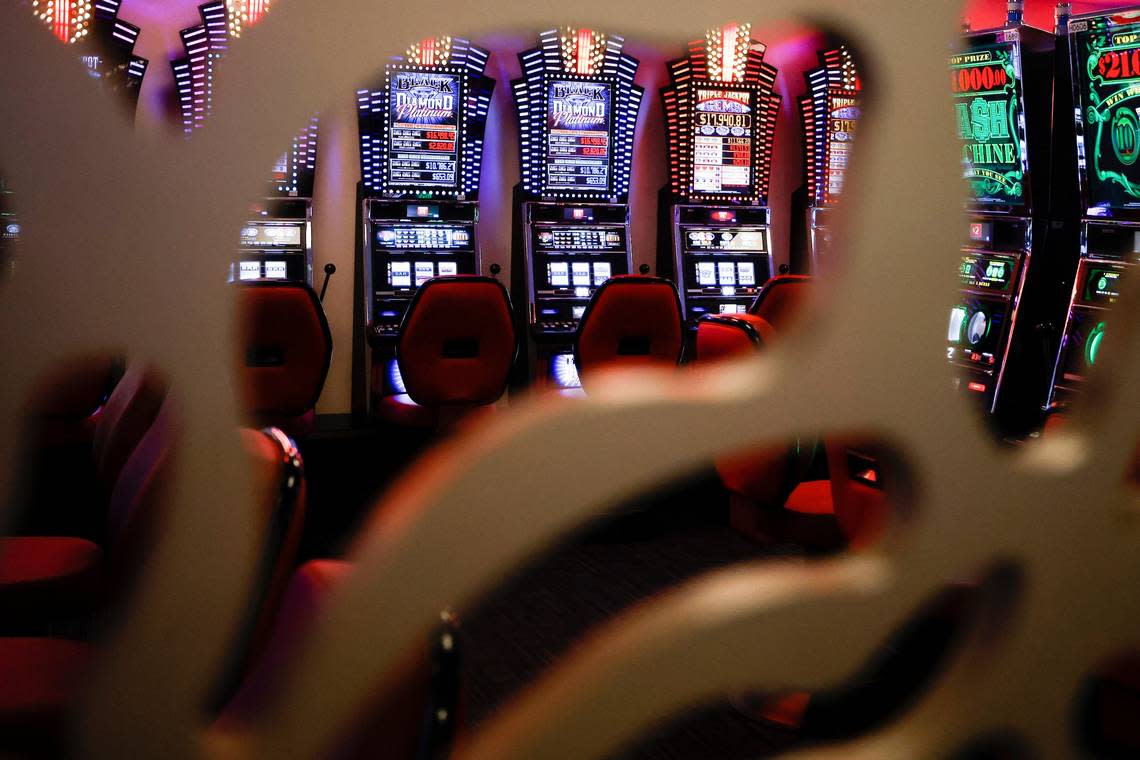If you win money at a casino, do you have to pay taxes on it? An NC tax expert explains
If you win big at a casino, how much do you actually get to keep?
After an eventful summer in the gambling sphere — with Gov. Roy Cooper legalizing sports betting, a new casino opening up just across the North Carolina border and a rezoning controversy in Rockingham County to potentially build a casino — we wanted to learn more about how gambling winnings are taxed.
The News & Observer spoke with Nathan Goldman, an NC State associate professor of accounting, to learn how Uncle Sam taxes casino winnings — and how they need to be reported to the Internal Revenue Service.
How much do you pocket if you win big at the casino?
A big win, according to the federal government, is anything over $5,000. If you win anything more than that, the casino will automatically deduct 24% of your earnings.
“If you win more than $5,000, the government knows you made that money, and the casino will automatically hand you 76% of it. For an even example, if you win a $10,000 jackpot, you’re going home with $7,600,” Goldman said.
Here’s the breakdown:
• Winning $0.01 to $599.99: The IRS does not require you to report income under $600, Goldman said. Still, you should report all income — and casino earnings are considered income.
North Carolina’s tax rate is 4.75%, meaning you would owe $4.75 on a $100 win.
• Winning $600.00 to $4,999.99: You are required to report any earnings over $600 to the IRS. You are required to collect these records yourself and report it as income, then pay the state’s 4.75% tax on it.
If you win $3,000, for example, you would get $142.50 deducted and pocket $2,857.50.
If your winnings are within this range, the payer is required to issue you a Form W-2G, which is a gambling-specific tax form. The $600 reporting threshold is new as of this year.
• Winning $5,000 or more: The casino automatically deducts 24% and hands you the remaining 76%.
“Some taxpayers pay a higher rate than 24%, so at the end of the year, you have to make up the difference. But if you have a lower tax rate, you actually get a refund at the end of the year,” Goldman said.
Note: Large casino winnings change your income, which can also change your tax rate.

If you’re an NC resident, do you pay NC taxes on out-of-state casino winnings?
No. You pay the state’s tax rate of the casino in which you earned money, Goldman said.
North Carolina residents gambling at the new Danville Caesars Casino, located in Virginia but very close to the state border, will need to pay Virginia’s tax rate.
Virginia’s rates are more progressive than North Carolina’s, Goldman said, with the top tax bracket of 5.75%. But earlier earnings in the state are taxed at a lower rate than that.
“It’s a little complicated when trying to compare it to a flat tax rate of 4.75% in North Carolina,” he said.

Can you deduct casino losses on your taxes?
Yes, but there are some rules to keep in mind.
• Rule #1: You can only deduct losses if you have already won.
“Most of us go to the casinos and lose money, so you don’t get some tax benefit because you lost money at the casino,” Goldman said.
“You get a tax benefit if you win money one time but lose money a lot of times. And winning money one time is a rarity.”
• Rule #2: Your losses cannot exceed your winnings.
“Remember you would rather win and pay taxes on that, not lose more money. Even if you’re at the top 37% tax rate, if you win $10,000, you’re still taking home $6,300,” Goldman said.
“If you win $10,000 and keep gambling for the purposes of tax deductions, you can win $10,000 and then lose $10,000, and then you take home nothing. I like to tell my students that you’d rather win something than lose nothing.”
• Rule #3: After you win a huge jackpot, (almost) anything lost afterwards is tax-deductible.
“Let’s say someone wins an astronomical jackpot, like $1 million. The casino takes 24%, so you’re pocketing $760,000. You’re likely not going to gamble that much money,” Goldman said.
“If you gamble $100,000 away after that huge win, that’s a $100,000 tax deduction. So winning the huge jackpot, as rare as it is, has other major perks.”

What do I need to provide the IRS to deduct gambling losses?
You may deduct gambling losses only if you itemize your deductions on Schedule A (Form 1040) and keep a record of your winnings and losses. Here’s how you need to do that:
You must keep an accurate diary or similar record of your losses and winnings for the purposes of filing your taxes. The diary should include:
The date and type of your specific wager or wagering activity.
The name and address or location of the gambling establishment.
The names of other persons present with you at the gambling establishment.
The amount(s) you won or lost.
You should also have additional documentation as further proof. This can include:
Form W-2G: Certain Gambling Winnings
Form 5754: Statement by Person(s) Receiving Gambling Winnings
Wagering tickets
Canceled checks
Substitute checks
Credit records
Bank withdrawals
Statements of actual winnings or payment slips provided to you by the gambling establishment
For specific wagering transactions, the following items should be used to support winnings and losses:
Keno: Copies of the keno tickets you purchased that were validated by the gambling establishment, copies of your casino credit records, and copies of your casino check-cashing records.
Slot machines: A record of the machine number and all winnings by date and time the machine was played.
Table games: Such as twenty-one (blackjack), craps, poker, baccarat, roulette, wheel of fortune, etc. The number of the table at which you were playing. Casino credit card data indicating whether the credit was issued in the pit or at the cashier’s cage.
Bingo: A record of the number of games played, cost of tickets purchased, and amounts collected on winning tickets. Supplemental records include any receipts from the casino, parlor, etc.
Racing: Such as horse, harness, dog, etc. A record of the races, amounts of wagers, amounts collected on winning tickets, and amounts lost on losing tickets. Supplemental records include unredeemed tickets and payment records from the racetrack.
Lotteries: A record of ticket purchases, dates, winnings, and losses. Supplemental records include unredeemed tickets, payment slips, and winnings statements.
Source: irs.gov/publications/p529
Sports betting legalized in NC: What you need to know about law changes
We checked out the new casino that’s 90 minutes from the Triangle. Here’s your guide
